5 Side Effects Of Eating Too Much Spinach
Gorging mindlessly on spinach like Popeye may make you sick instead of strong!
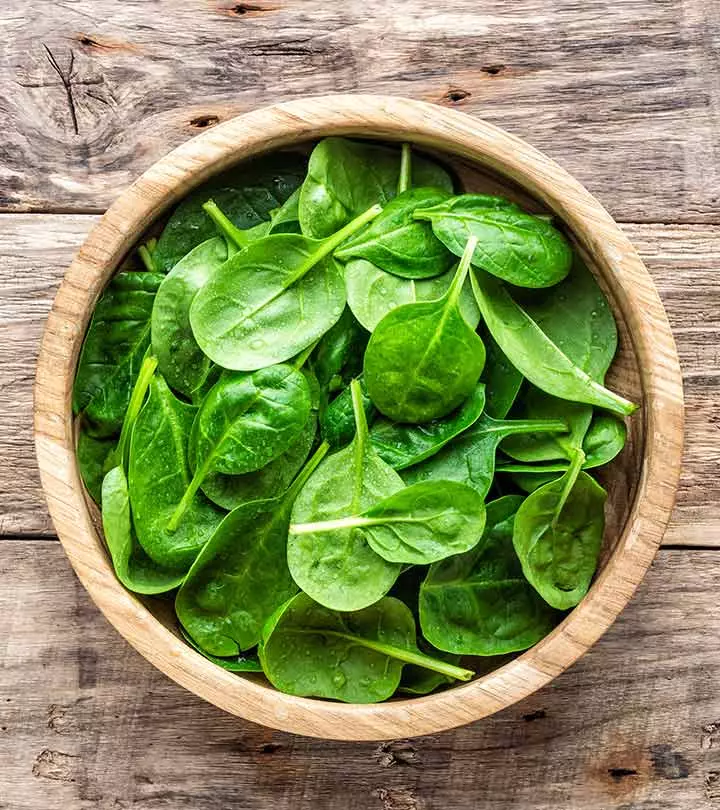
Image: istock
Several side effects of spinach might give you second thoughts about this leafy green. Spinach is an extremely healthy vegetable with a great nutritional profile. It is a good source of vitamins A, C, K, and B6, as well as iron, calcium, and magnesium. However, excessive consumption of spinach may lead to health problems like kidney stones since the veggie promotes urinary calcium excretion (1).
This article examines the side effects of spinach, its safety, and any potential drug interactions. Take a look below.
 Know The Flip Side: Spinach
Know The Flip Side: SpinachShort-Term Effects
A drop in blood pressure and blood sugar levels drop, may trigger IBS and hinder mineral absorption, bloating, gas, cramps, abdominal pain, and aggravate gout symptoms.
Long-Term Effects
Kidney stones
Drug Interactions
May interfere with blood thinner drugs and ACE inhibitors (to lower blood pressure).
When To See A Doctor
If you experience severe stomach or abdominal pain, heavy diarrhea, or a high fever after eating spinach.
In This Article
What Are The Major Side Effects Of Spinach?
Spinach is high in oxalates, and their excess intake over a period may lead to the formation of kidney stones. The vitamin K in spinach may also interfere with blood thinners and certain other medications.
1. May Increase Kidney Stone Risk

Spinach contains oxalates, which are compounds that can form stones in the human system if consumed in excess. These stones are formed by an increase in oxalate content in the urine. The most common types of kidney stones are calcium oxalate stones (1). Dehydration or lack of fluid intake may exacerbate the condition (2).
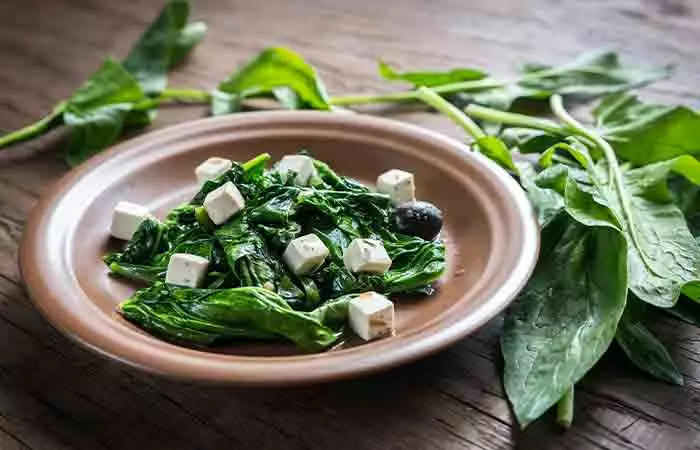
A hundred grams of spinach contains 970 milligrams of oxalates (3).

Boiling spinach may reduce the oxalate concentration to some extent. Combining a calcium-based food (like curd or cottage cheese) with spinach can also prevent stone formation (4). However, every individual’s condition is unique, and the reaction may differ from person to person. Hence, please check with your doctor if you can include spinach in your diet.
2. May Interfere With Blood Thinners

Spinach contains high levels of vitamin K, a mineral that reduces the effectiveness of blood thinners. Blood thinners are usually given to prevent the onset of stroke. Hence, susceptible individuals must reduce their spinach intake (5).
Warfarin is a blood thinner that is prescribed for individuals who are at risk of forming harmful blood clots. Vitamin K was found to reduce the effectiveness of Warfarin (6). This is because vitamin K plays a vital role in forming blood clots in your body.
While half a cup of cooked spinach contains 444 mcg of vitamin K, one cup of raw spinach contains 145 mcg of the nutrient (7). Cooked spinach has higher vitamin K levels as heat increases the absorption of the nutrient.
However, you should not eliminate vitamin K from your diet as foods rich in the nutrient, like spinach, contain other essential vitamins and minerals as well. Vitamin K boosts heart health and may play an important role in the prevention of arterial calcificationsi Accumulations of calcium deposits in artery walls, which can cause stiffness, decreased blood flow, and a higher risk of heart attacks and strokes. , coronary heart disease, and lower bad cholesterol levels. It may also aid in cancer prevention and boost bone health by alleviating osteoporosisi A disorder where the bones become weaker and more brittle because of decreased bone mass and density. (8). It is best to consult your doctor, who may increase the dosage of your blood thinner.
Eating spinach occasionally, in moderation, could be a safer option (provided the person is stable and not in an acute phase of illness).
 Trivia
Trivia3. May Hinder Mineral Absorption

Anecdotal evidence suggests that spinach may lead to nutrient deficiencies, especially of calcium and magnesium due to its high oxalic acid content. This may lead to an electrolyte imbalance.
There is some research that the intake of oxalate-rich foods can inhibit mineral absorption. Oxalate is an antinutrient (9).
The oxalates in spinach may also hinder the absorption of minerals like calcium. Spinach contains both oxalates and calcium, and consuming it in large amounts may impair the absorption of calcium in your system (10).
Spinach didn’t seem to have this effect on calcium when it was taken along with milk (10). This is because though spinach contains calcium, the nutrient from the vegetable is absorbed only one-tenth as efficiently as milk calcium (11).
The oxalates in spinach can also react with iron and inhibit its absorption by forming crystals (12). Decreased mineral absorption may lead to iron-deficiency anemia (13).
However, there is a bright side. Cooking spinach can help reduce its oxalate content. This is good news for people who are at risk of kidney stones. Boiling or steaming spinach before eating may also help prevent some problems that come with high oxalate levels.
Spinach is also thought to compromise thyroid function, generally by inhibiting iodine utilization, as it contains certain compounds called goitrogens (14). However, research is mixed in this regard. Taking raw spinach may interfere with thyroid medication and those taking medication may experience low energy levels and disturbed mood. If you have thyroid issues, please consult your doctor before including spinach in your diet.
4. May Aggravate Symptoms Of Gout

Spinach contains purines, chemical compounds that are thought to contribute to gouti A form of arthritis where uric acid crystals accumulate in the joints, causing sudden episodes of intense pain, swelling, and redness, usually in the big toe. . Gout is a common cause of chronic inflammatory arthritis in the US. Joint inflammation is accompanied by pain and swelling (15).
Marty Martinson, a blogger, spoke about how foods such as spinach aggravated his gout. He said, “I’ve eaten spinach, asparagus, Bearnaise, alcohol, and plenty of processed carbs and sugars. Guess what, I can feel the uric acid level in my body rising. It’s those little signals in my feet and ankles (i).”
However, there is a lack of a significant association between the intake of purine-rich vegetables and gout (16). Hence, further research is warranted before we can arrive at a definitive conclusion.
But it is always better to stay safe. If you are dealing with gout, please talk to your doctor about your spinach intake. Since the leafy green may also interfere with certain medications, be sure to talk to your doctor if you are on any.
Some anecdotal evidence suggests that excess intake of spinach may cause an individual’s blood pressure and blood sugar levels to drop too low. This could be an issue for those who are on medications for treating high blood pressure and high blood sugar. However, more research is needed to confirm these effects. If you are on blood sugar or blood pressure medication, make sure to consult your doctor before including spinach in your diet.
5. Spinach Allergy

While spinach allergies are not commonly reported, some people may experience them when potential allergens attack the body’s immune system and trigger allergic responses. Spinach is also a high-histamine food and is often unsuitable for people with histamine sensitivity (17). Further, the oxalates in spinach may also cause an adverse reaction in some individuals (18). Certain other individuals may experience the following symptoms upon consumption of even small amounts of spinach (18):
- Itching or tingling sensation in the mouth and throat
- Swollen lips, tongue, face, or throat
- Runny or blocked nose
- Skin rashes or hives
- Excessive sneezing and coughing
- Nausea or vomiting
- Breathing problems
- Diarrhea or stomach cramps
- Anaphylaxis or life-threatening allergies in severe cases
 Did You Know?
Did You Know?Key Takeaways
- Spinach is high in oxalates, which often leads to the formation of kidney stones.
- Its high vitamin K content may interact with blood-thinning medications such as Warfarin and reduce its effectiveness.
- Spinach contains compounds called goitrogens that may interfere with thyroid function.
- The presence of chemical compounds called purines may contribute to gout.
Infographic: Unexpected Side Effects Of Spinach
Spinach is considered a very healthy leafy green with a multitude of benefits. However, excess consumption of spinach may lead to several adverse effects. While we have covered all the negative effects of spinach in the article, you must be aware of a few serious side effects of this leafy green. Click on the infographic below to learn about the unexpected side effects of eating too much spinach.
Some thing wrong with infographic shortcode. please verify shortcode syntax
While excessive spinach consumption can lead to certain side effects, taking the right precautions can help you enjoy its benefits with minimal risks. Scroll down to learn more.
Tips To Avoid The Side Effects Of Spinach
Make a note of the following precautions to consume spinach safely:
- Do not eat too much spinach, especially raw, as it contains a lot of oxalate, which can cause kidney stones and upset your stomach.
- Boiling or steaming spinach can help reduce oxalate levels, making it safer for those prone to kidney stones.
- Consuming spinach with meals high in calcium, such as dairy or tofu, helps prevent kidney stones from forming.
- Drinking plenty of water helps flush out excess oxalates and prevents kidney stone formation.
- Since purines in spinach may elevate uric acid levels, those with renal illness or gout should speak with a doctor before consuming significant amounts of spinach.
- Consult your doctor before including spinach in your diet if you suffer from medical ailments such as blood clotting disorders, thyroid problems, or kidney conditions.
Spinach benefits human health with its rich nutrient profile, but it is not always a good veggie for everyone. The negative effects of excess consumption of spinach may counter its health benefits. The side effects of spinach include aggravated gout symptoms to hindered mineral absorption. These adverse effects are generally attributed to its high oxalate levels. Spinach may also increase the risk of renal disorders due to the accumulation of oxalates in the body. In some cases, it may even trigger allergic reactions or interfere with the functioning of certain medications, especially blood thinners. Try limiting spinach intake to reduce the risk of such complications.
Frequently Asked Questions
Does spinach trigger IBS?
Sunui Escobar, DCN, RDN, FAND, says, “Spinach may trigger IBS symptoms if eaten in large amounts. It contains relatively low amounts of fructans, which some people with IBS are sensitive to. However, if you eat several servings of spinach over a day, the fructans in spinach can really add up and cause digestive distress for some people.”
Can you be intolerant to spinach?
According to Escobar, “Spinach stimulates the release of histamine in the body and may not be suitable for those with histamine intolerance.” These histamines may cause headaches, hives, fatigue, or digestive problems. You can replace spinach with water spinach if you have allergies, as water spinach offers similar nutritional benefits.
Is spinach good for your bowels?
“Spinach is a good source of prebiotics that can help healthy bacteria in the gut grow and proliferate. Spinach is also a good source of insoluble fiber, which can help with constipation,” says Sunui.
Does spinach cause colitis?
Eva De Angelis, Dietitian Nutritionist, says, “Colitis is not caused by food. However, if you have colitis, what you eat has a huge impact on your health and symptoms. Raw spinach, for example, may aggravate symptoms due to its high fiber content.”
How much of spinach is too much?
The lethal oral dose of oxalate in humans is between 15 to 30 grams (17). This could be between 3 to 6 pounds of spinach. It is highly unlikely for anyone to consume so much spinach in a short span of time. However, there is less research to understand if this dose is enough to lead to kidney stone formation.
Can raw spinach be bad for you?
Spinach, raw or cooked, offers great benefits. But if you have kidney stones or are on certain medications (like blood thinners, etc.), you may want to avoid spinach.
Can you eat spinach and tomatoes together?
Like spinach, tomatoes also contain oxalates (18). Hence, if you are someone prone to kidney stones or any drug interactions, you may be required to limit your intake of tomatoes.
Can spinach make your stomach hurt?
Spinach, by itself, may not hurt your stomach. However, eating too much spinach all too soon may mean a sudden increase in your fiber intake. This may lead to a temporary stomach upset. You may experience bloating, gas, or diarrhea.
On the other hand, pain in the stomach (especially on the side) could be a symptom of kidney stones. If you suspect this could be the case, please visit your doctor.
Why should we not eat spinach at night?
Spinach is rich in minerals, the excess of which needs to be excreted through the urinary system. At night, the tendency to drink water to dilute their concentrations as well as the frequency of urinating tend to be low. As a result, these excess minerals may form crystals/stones in the bladder over time. This is why regular consumption of spinach and other green leafy vegetables at night is not recommended.
How can spinach become toxic?
Spinach can become toxic when they are not cooked properly. The natural toxins in spinach can harm human health when consumed in excess and without cooking properly. The changing gasses of the atmosphere at different temperature levels may also cause spoilage and lead to food poisoning, making it toxic (19).
Illustration: Side Effects Of Eating Too Much Spinach
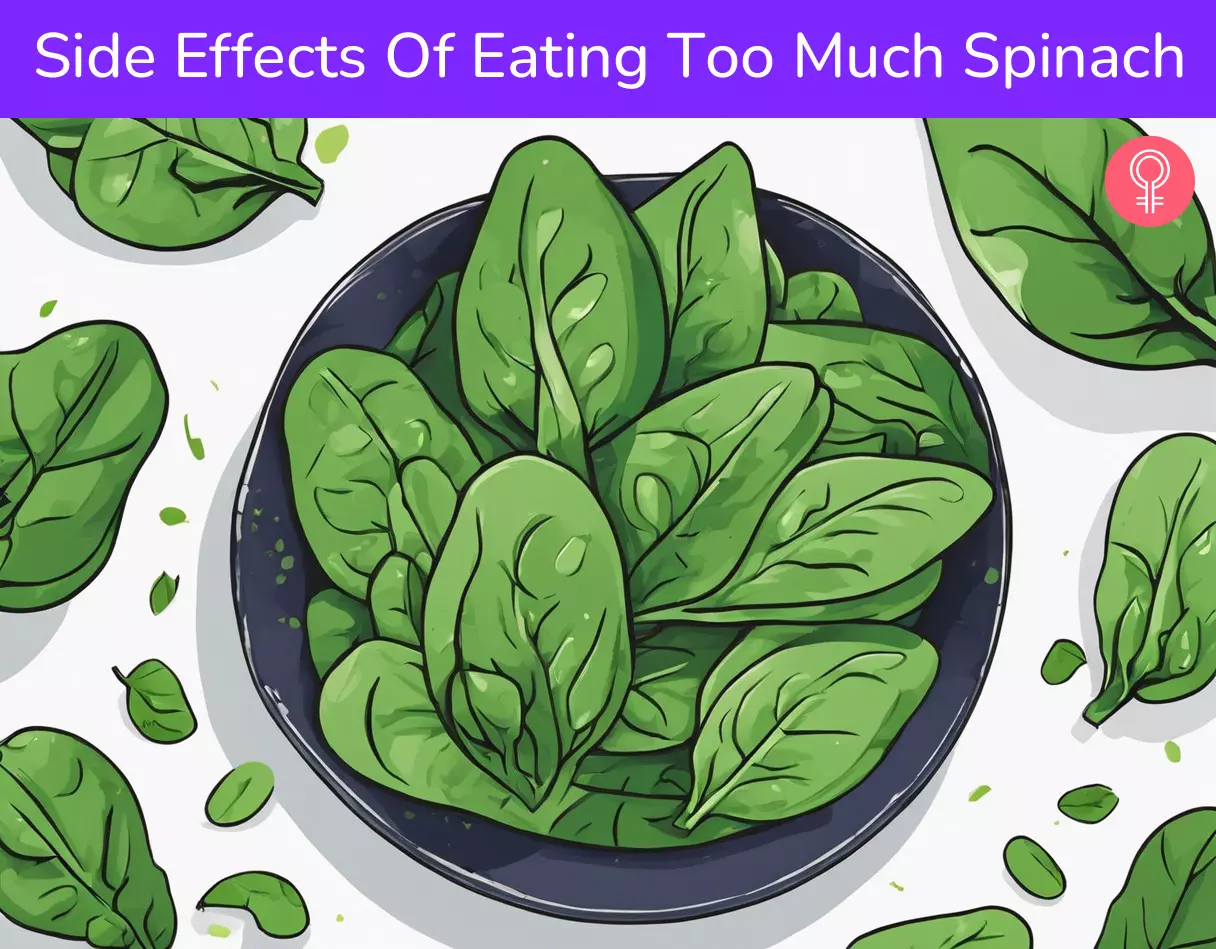
Image: Stable Diffusion/StyleCraze Design Team
Discover the surprising side effects of excessive spinach consumption with this eye-opening video. Watch it to learn how to incorporate this leafy green wisely for maximum health benefits.
Personal Experience: Source
StyleCraze's articles are interwoven with authentic personal narratives that provide depth and resonance to our content. Below are the sources of the personal accounts referenced in this article.
(i) My Gout Diary, Day 11https://medium.com/@mmartinson2008/my-gout-diary-day-11-838d36b7c00e
References
Articles on StyleCraze are backed by verified information from peer-reviewed and academic research papers, reputed organizations, research institutions, and medical associations to ensure accuracy and relevance. Read our editorial policy to learn more.
- Effect of dietary oxalate and calcium on urinary oxalate and risk of formation of calcium oxalate kidney stones. Journal of the American Dietetic Association US National Library of Medicine National Institutes of Health.
https://pubmed.ncbi.nlm.nih.gov/8335871/ - The role of fluid intake in the prevention of kidney stone disease: A systematic review over the last two decades US National Library of Medicine National Institutes of Health.
https://www.ncbi.nlm.nih.gov/pmc/articles/PMC7731957/ - Nutritional Management of Kidney Stones (Nephrolithiasis) Clinical Nutrition Research US National Library of Medicine National Institutes of Health.
https://www.ncbi.nlm.nih.gov/pmc/articles/PMC4525130/ - Effect of Cooking on Soluble and Insoluble Oxalate Contents in Selected Pakistani Vegetables and Beans International Journal of Food Properties Taylor & Francis Online.
https://www.tandfonline.com/doi/full/10.1080/10942910903326056 - Medication Interactions: Food Supplements and Other Drugs American Heart Association.
https://www.heart.org/en/health-topics/consumer-healthcare/medication-information/medication-interactions-food-supplements-and-other-drugs - Vitamin K Intake and Sensitivity to Warfarin in Patients Consuming Regular Diets Thieme E-Journals ResearchGate.
https://www.researchgate.net/publication/13189726_Vitamin_K_Intake_and_Sensitivity_to_Warfarin_in_Patients_Consuming_Regular_Diets - Why Vitamin K Can Be Dangerous If You Take Warfarin Cleveland Clinic.
https://health.clevelandclinic.org/vitamin-k-can-dangerous-take-warfarin - The health benefits of vitamin K OpenHeart US National Library of Medicine National Institutes of Health.
https://www.ncbi.nlm.nih.gov/pmc/articles/PMC4600246/ - Expression Analysis of Oxalate Metabolic Pathway Genes Reveals Oxalate Regulation Patterns in Spinach Molecules US National Library of Medicine National Institutes of Health.
https://www.ncbi.nlm.nih.gov/pmc/articles/PMC6100029/ - Oxalate: effect on calcium absorbability The American Journal of Clinical Nutrition US National Library of Medicine National Institutes of Health.
https://pubmed.ncbi.nlm.nih.gov/2801588/ - Calcium National Center for Biotechnology Information.
https://www.ncbi.nlm.nih.gov/books/NBK109827/ - Making Spinach with Low Oxalate Levels United States Department of Agriculture.
https://agresearchmag.ars.usda.gov/2017/jan/spinach/ - Biochemistry Iron Absorption StatPearls US National Library of Medicine National Institutes of Health.
https://www.ncbi.nlm.nih.gov/books/NBK448204/ - The role of micronutrients in thyroid dysfunction Sudanese Journal of Paediatrics US National Library of Medicine National Institutes of Health.
https://www.ncbi.nlm.nih.gov/pmc/articles/PMC7282437/ - Gout StatPearls US National Library of Medicine National Institutes of Health.
https://www.ncbi.nlm.nih.gov/books/NBK546606/ - The Association of Dietary Intake of Purine-Rich Vegetables Sugar-Sweetened Beverages and Dairy with Plasma Urate in a Cross-Sectional Study PLoS One US National Library of Medicine National Institutes of Health.
https://www.ncbi.nlm.nih.gov/pmc/articles/PMC3368949/ - Oxalic acid Centers for Disease Control and Prevention.
https://www.cdc.gov/niosh/idlh/144627.html - Determination of total oxalate contents of a great variety of foods commonly available in Southern China using an oxalate oxidase prepared from wheat bran United States Department of Agriculture.
https://pubag.nal.usda.gov/catalog/1134181 - An Acute Toxicity in Human Health of Raw and Cooked Vegetable in Tomato and Spinach, Food Science & Nutrition.
https://www.researchgate.net/publication/344329690_An_Acute_Toxicity_in_Human_Health_of_Raw_and_Cooked_Vegetable_in_Tomato_and_Spinach
Read full bio of Madhu Sharma
- Dr. Su-Nui Escobar, DCN, RDN, FAND, is a Registered Dietitian/Nutritionist with over a decade of experience in nutrition and lifestyle for women during their perimenopausal and menopausal years. She is passionate about helping women to live their best lives through healthy eating and a healthy lifestyle. She obtained her doctorate from the University of North Florida.
 Dr. Su-Nui Escobar, DCN, RDN, FAND, is a Registered Dietitian/Nutritionist with over a decade of experience in nutrition and lifestyle for women during their perimenopausal and menopausal years. She is passionate about helping women to live their best lives through healthy eating and a healthy lifestyle. She obtained her doctorate from the University of North Florida.
Dr. Su-Nui Escobar, DCN, RDN, FAND, is a Registered Dietitian/Nutritionist with over a decade of experience in nutrition and lifestyle for women during their perimenopausal and menopausal years. She is passionate about helping women to live their best lives through healthy eating and a healthy lifestyle. She obtained her doctorate from the University of North Florida.
Read full bio of Ravi Teja Tadimalla
Read full bio of Arshiya Syeda
Read full bio of Sindhu Koganti






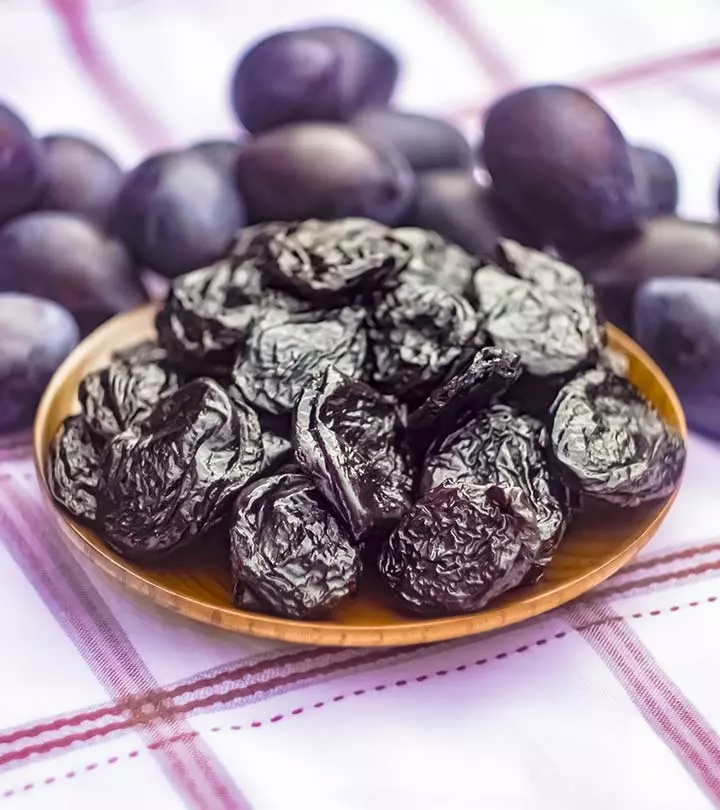

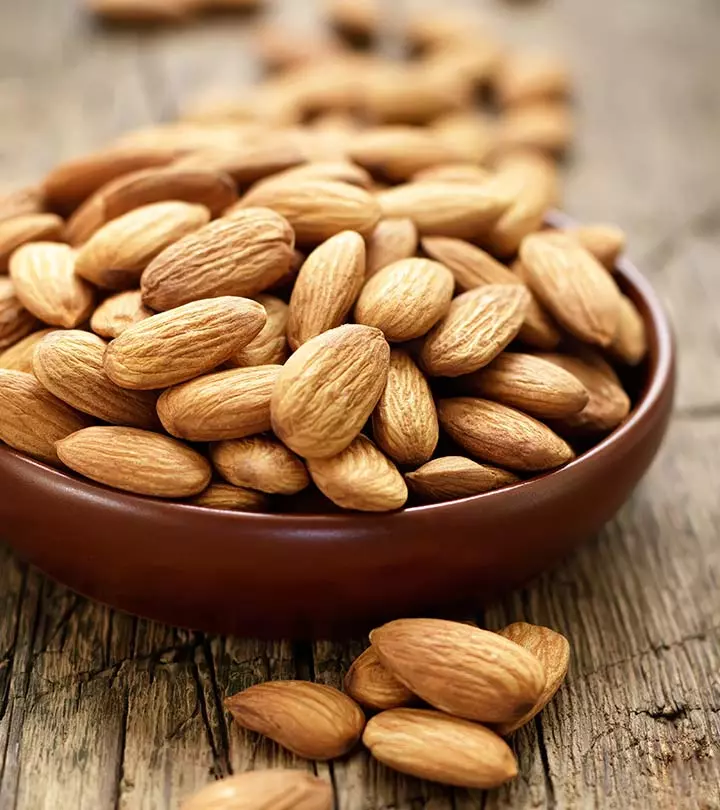
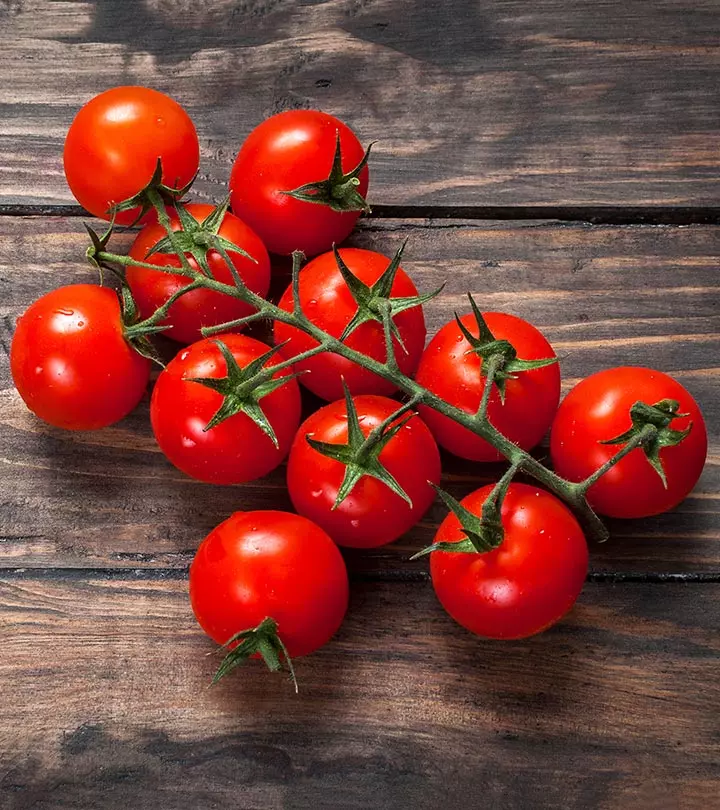


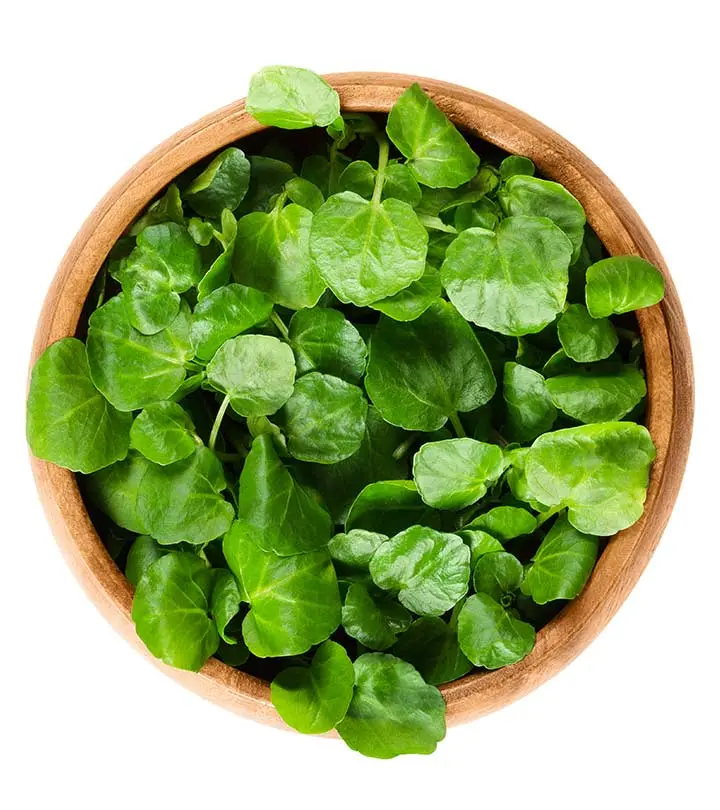
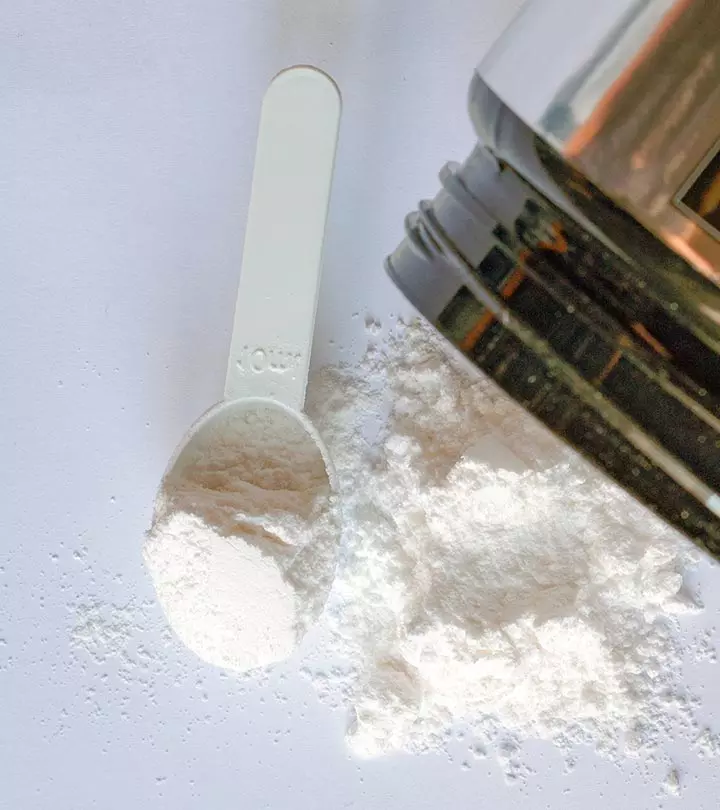







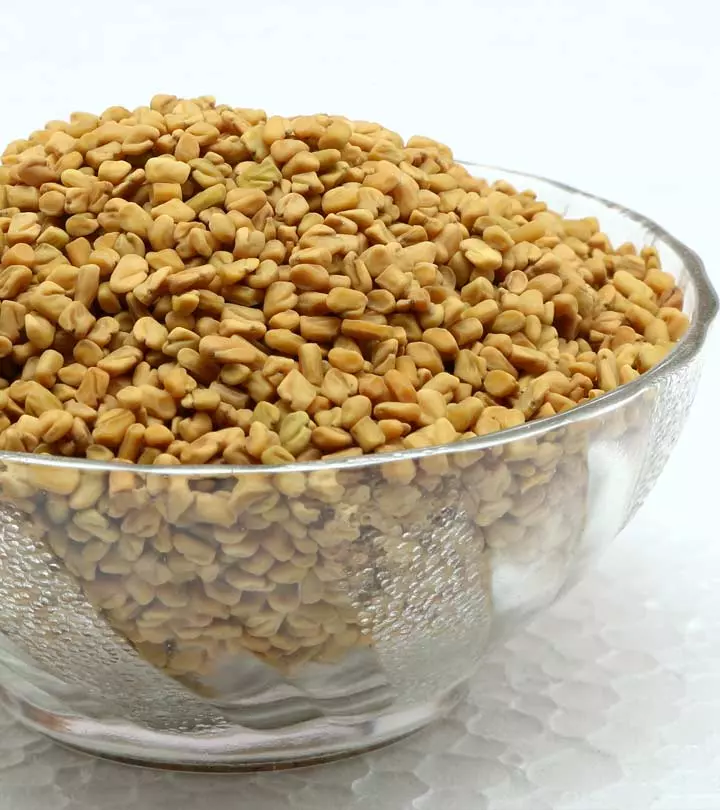

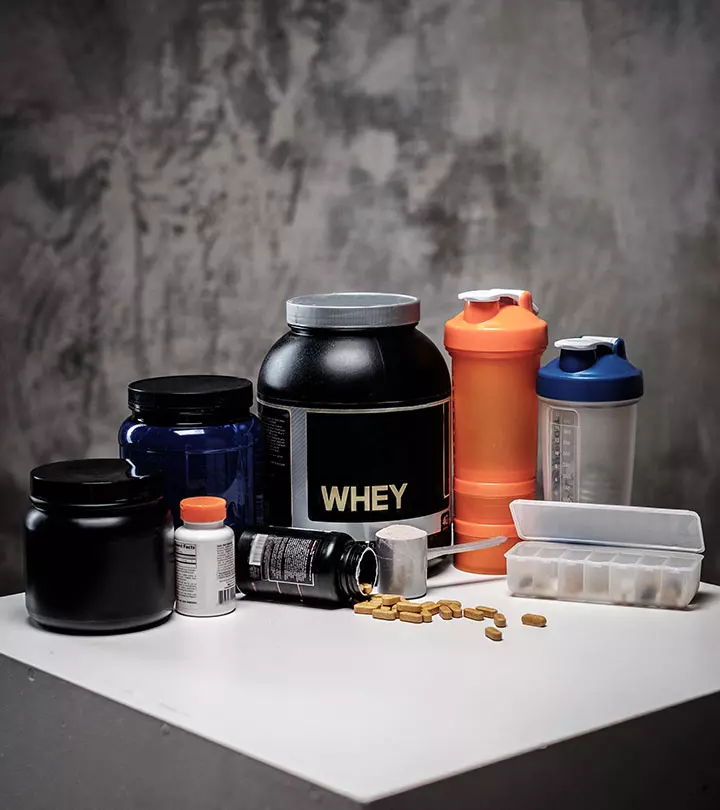

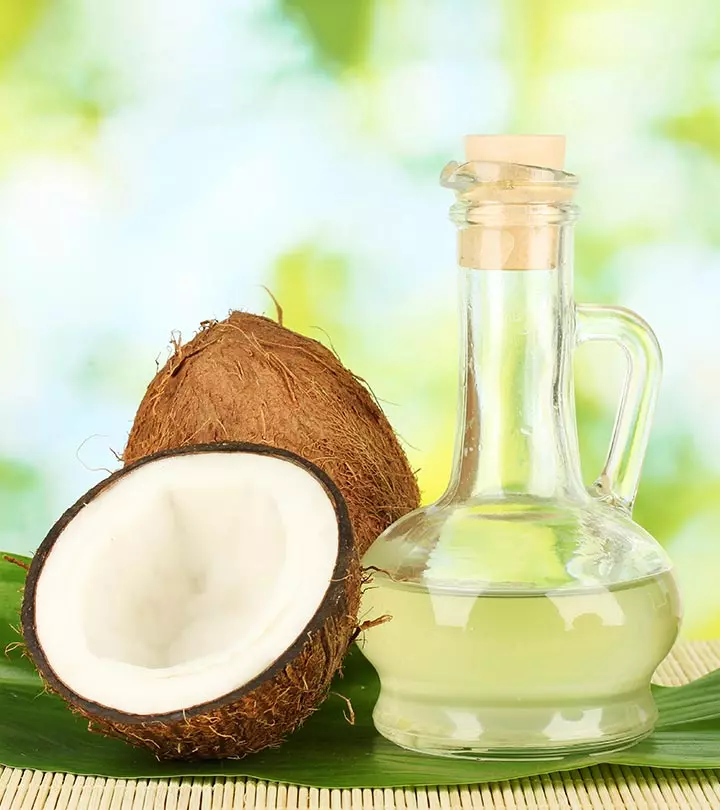

Community Experiences
Join the conversation and become a part of our empowering community! Share your stories, experiences, and insights to connect with other beauty, lifestyle, and health enthusiasts.